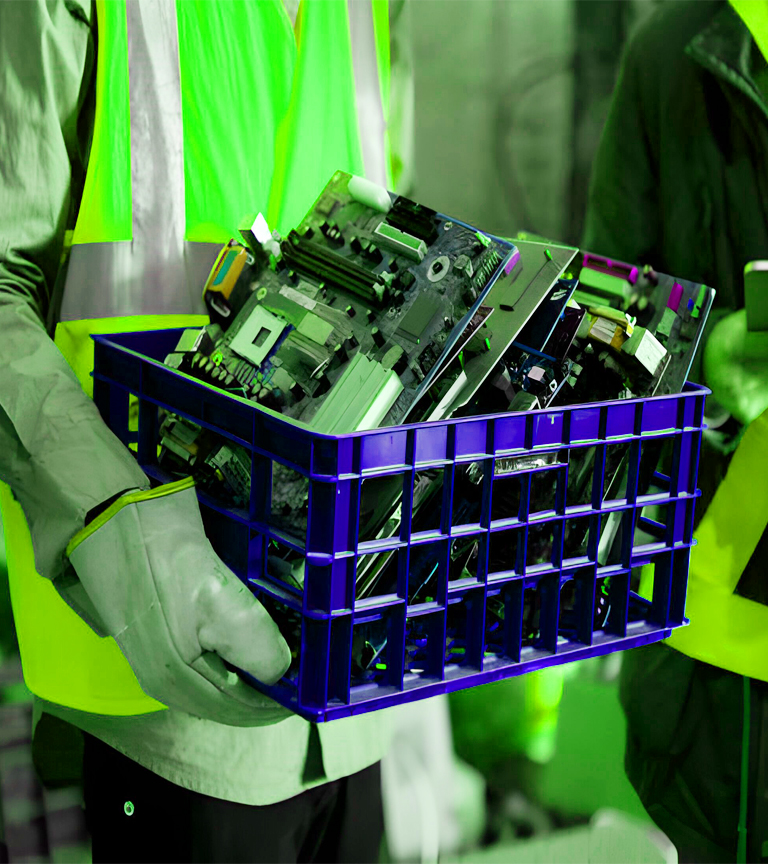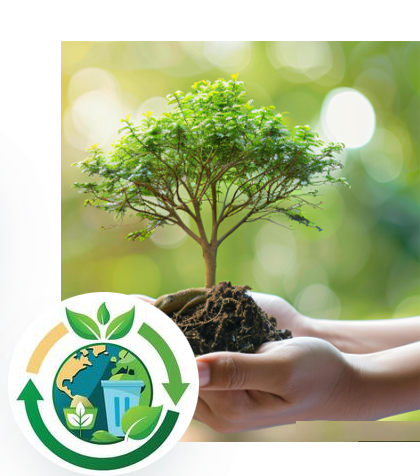Let’s explore the E-Waste Recycling Process
E-Waste Collection: – The process begins with the collection of electronic waste from multiple sources, including households, businesses, commercial establishments, electronics repairing center, and government agencies. To ensure that all the electronic waste gets collected properly, curbside pickups, drop-off centers, community recycling events, are included in the process. It helps in reducing the electronic waste that goes in the landfills or oceans or other places causing harm to environment.
Sorting of Electronic Waste: – When the electronic waste reaches the recycling centers or facilities, it gets sorted with the help of skilled technicians and labors. All the e-waste is meticulously segregated depending on several factors mainly the distinct material types—metals, plastics, glass, and circuit boards. This careful segregation helps in laying the groundwork for the subsequent steps of the recycling process, ensuring maximum resource recovery and efficiency.
Dismantling and Disassembling the e-waste: – Once the e-waste is well segregated, the dedicated staff begins with the dismantling and disassembling process. All the electronic devices are carefully disassembled by separating non-recyclable components like batteries, wires, and other hazardous materials from them. All the reusable material gets extracted and is sent for further processing.
Processing the reusable electronic waste: – To process it further, the extracted e-waste is segregated using different techniques like magnetic separation and eddy current separation. It helps in separating plastic materials, metals, and other components with ease. After separation, they are crushed and shredded into smaller components. Shredding the e-waste helps in maximizing material recovery and minimizes the volume of waste destined for disposal.
Refining and Purification: – Recovered and shredded metals undergoes refining and purification processes for the removal of impurities. It helps in refining materials like gold, silver, copper, aluminum and other metals to transform them into pristine resources for recycling them to reuse. Purification and refining is essential as it helps meet the stringent quality standards for formal e-waste recycling and reuse.
Manufacturing of new products using recycled e-waste: – After purification and refining recyclable electronic waste they are processed to manufacture new products. They can be transformed or fabricated into different materials depending on the types of the material, their usability, durability, and requirements. By incorporating recycled materials into the production of new electronics, manufacturers, producers, and brand owners reduce their reliance on virgin resources and contribute to a more sustainable and circular economy.
Responsible Disposal of Non-Recycled Material: – E-Waste Recycling not only focuses on the recycling of e-waste but it also pays attention to the proper disposal of non-recycled material which includes hazardous substances like lead, mercury, and certain plastics that require specialized treatment to minimize environmental impact. Through careful disposal methods and adherence to strict regulations, responsible recyclers ensure that these materials are managed safely.
Reuse or refurbishing electronic waste: – Other than the recyclable and non-recyclable electronic waste, there are multiple gadgets, devices, and components that can be reused or refurbished for further use. Such electronic waste items are tested, repaired, and made available to reuse by the consumers. It helps extending the lifespan of such devices and components instead of throwing them away which also increases the resource efficiency.
E-waste recycling plays a dynamic role in mitigating environmental pollution, increasing resource conservation, and promoting sustainable development. It is imperative for individuals, businesses, and governments to collaborate and prioritize responsible e-waste management to address this global challenge effectively. The e-waste recycling facilities adhere to environmental regulations and standards set by local authorities and organizations like CPCB which makes e-waste recycling more feasible in present time. E-Waste Recycling is now a part of E-Waste EPR Program and it helps producers and manufacturers to document and report the complete recycling process in detail.
Benefits of E-Waste Recycling
Increase in the e-waste in the past few years has raised a major concern towards the increasing environmental pollution. But thanks to the e-waste recycling measures demonstrated by regulatory authorities and organizations which are highly contributing towards the reduction of electronic waste. It is known for offering multiple benefits that are shared below.
Environmental Conservation: – E-waste contains hazardous materials and chemicals which can lead to soil pollution, water pollution, and air pollution. The hazardous substances like lead, mercury, and cadmium, can leach into the environment if not disposed of properly. The availability of e-waste recycling helps prevent all these pollutions preserving ecosystems and protecting biodiversity.
Reducing electronic waste: – The rapid pace of technological advancement leads to shorter product lifecycles and increased obsolescence. Discarding gadgets and devices at such a rapid speed is not only increasing the wastage of resources but is also increasing electronic waste. By recycling e-waste, we can divert it from landfills and oceans and can bring it to better use. Else, it would only contribute to the accumulation of non-biodegradable waste and hazardous contamination.
Boosting Data Security:– Improper disposal of electronic gadgets can result into the data breach and data theft related problems. It can result into the disclosure of sensitive data which may damage one’s privacy. E-Waste Recycling focuses on the proper disposal of electronic devices which helps safeguarding sensitive data and protecting personal privacy. E-Waste Recycling ensures that data-containing devices are securely wiped or destroyed, mitigating the risk of identity theft and data breaches.
Conservation of Resources: – Electronic devices are not alone made of one or two material, instead they consists of several valuable materials including gold, silver, copper, and other metals. E-Waste recycling enables the recovery of these resources, reducing the need for raw material extraction and conserving finite natural resources. It lets manufacturers and producers utilize the extracted metals in the fabrication of new electronic goods which also saves energy.
Encouraging Corporate Responsibility: – Over the past few years, businesses have become aware of the corporate social responsibility and are taking serious measures regarding the same. Though, government is playing a major role in this by implementing regulations and directives to address e-waste management comprehensively. Compliance with these regulations ensures that e-waste is managed responsibly; minimizing environmental and health risks. Implementation of e-waste recycling programs at business front demonstrates a commitment to environmental stewardship and ethical business practices which also enhances brand reputation and customer loyalty.
For fostering the economic development along with mitigating environmental pollution and promoting a sustainable consumption of resources, e-waste recycling is a necessity. It is essential to embrace responsible and formal e-waste management practices for building a resilient and environmentally sustainable future.










